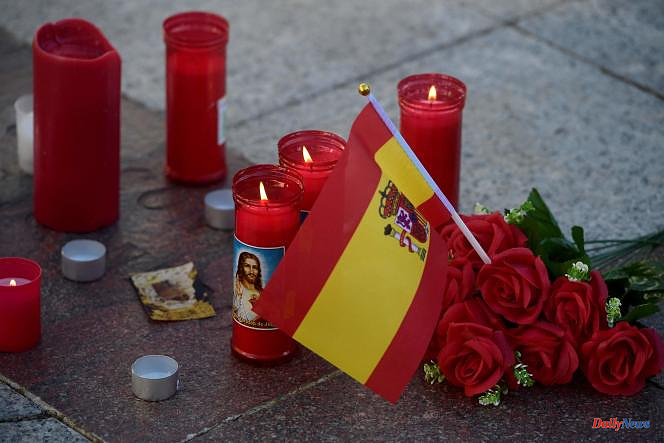Radicalized in a month. In view of the first elements of the investigation, the attack on two churches in Algeciras, which took place on Wednesday January 25 in southern Spain, "can be qualified as a jihadist attack", directed in particular against representatives of the "Catholic Church". The alleged perpetrator, Yassine Kanjaa, 25, acted "consciously" and within the framework of a "jihadist" ideology, according to Spanish justice, which placed him on Monday January 30 in pre-trial detention.
The judge investigating the machete attack on Monday accused Yassine Kanjaa of "terrorism" and placed him "in custody", the National Court, Madrid's court in charge of terrorism cases, said in a statement. .
Yassine Kanjaa is accused of attacking the priest of the church of San Isidro in Algeciras with a machete. The facts took place on Wednesday January 25 at the end of the day, in this port city of 120,000 inhabitants located in the south of Andalusia. The 74-year-old priest was seriously injured in the neck and then hospitalized.
According to the authorities, the alleged perpetrator then went to the Nuestra Señora de La Palma church, a few hundred meters away, where he attacked a sexton, on whom he inflicted "several fatal injuries ". The sixty-year-old sexton died in the square in front of the church.
According to the National Audience, three other people were injured by Yassine Kanjaa. Among them is a man of Moroccan nationality whom he allegedly attacked "with the desire to kill him", accusing him of having distanced himself from Islam.
Arrested immediately after the facts, Yassine Kanjaa had been the subject of an expulsion procedure for an irregular situation since June 2022, according to the authorities. This young man, who lived not far from these two churches, was also unknown to the intelligence services, according to the Ministry of the Interior.
An extremely rapid "religious radicalization process"
In a court document consulted by Agence France-Presse (AFP), the magistrate in charge of the case made the link between this attack and "jihadist Salafism" on Friday. He also said that after his arrest, the suspect had "repeatedly shouted 'Allah akbar!' " (" God is big ! ").
But the government had not ruled out the hypothesis of mental disorders. A neighbor of the suspect had told AFP that the young Moroccan "was not feeling well in his head" and that he had "totally changed in just over a month", letting himself "grow out his beard" and dressing "no more than a djellaba".
The police also insisted in a statement on Monday on the "unstable" side of Yassine Kanjaa, a young man who "had no criminal history" and "whose self-radicalization would have occurred" very quickly.
For Judge Joaquin Gadea, in charge of the case at the National Audience, Yassine Kanjaa indeed had "a life that some describe as 'normal'" a few weeks ago, and experienced "a process of radicalization religious" extremely fast.
But in view of the statements of his entourage, the elements found on his telephone and his remarks in police custody, he would have indeed acted in a "conscious" way, by targeting in a "deliberate" way the religious and the Moroccan that he considered "infidel", said the judge, quoted by the National Audience.
An approach that fully inscribes its action in the "jihadist phenomenon" intended to cause "terror within society", even though Yassine Kanjaa acted "alone" and without connection with a "determined terrorist organization", concludes the judge .












